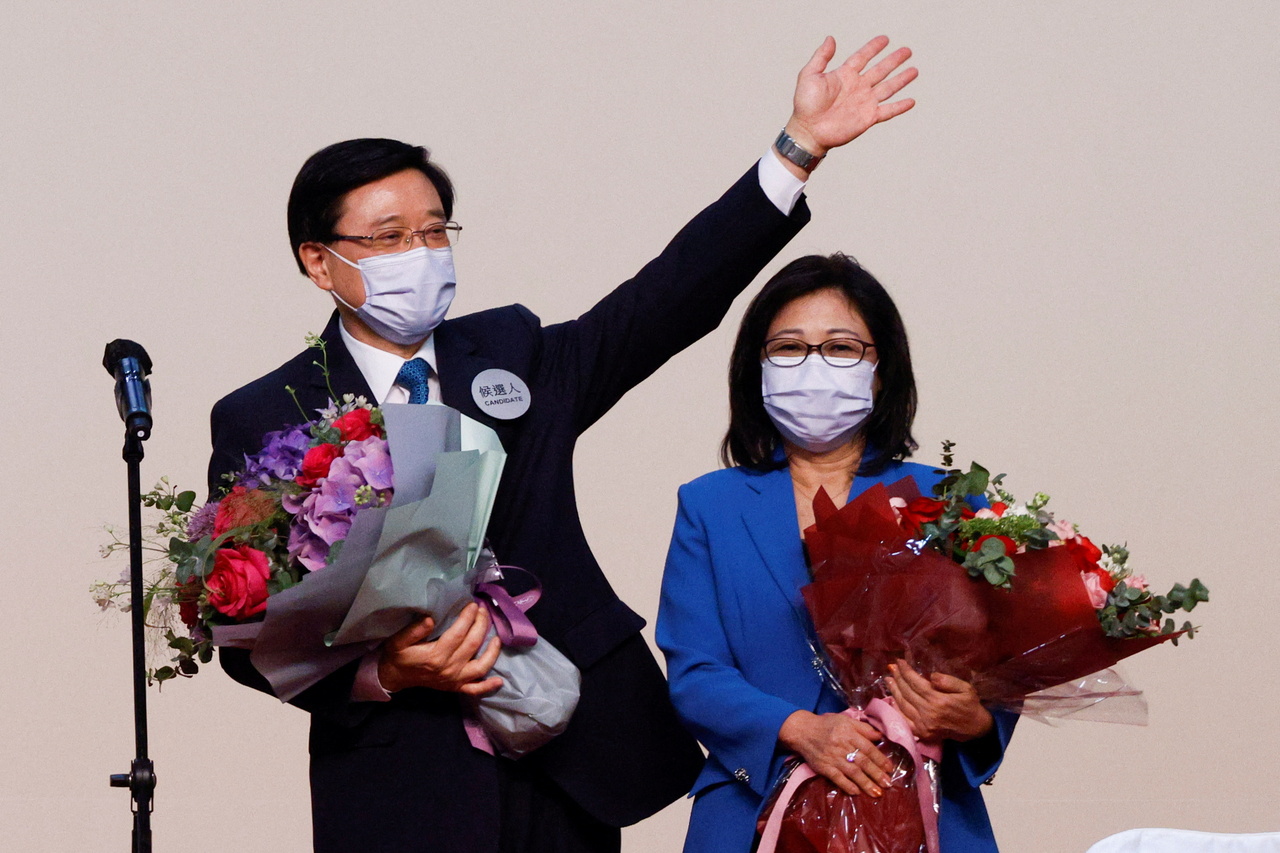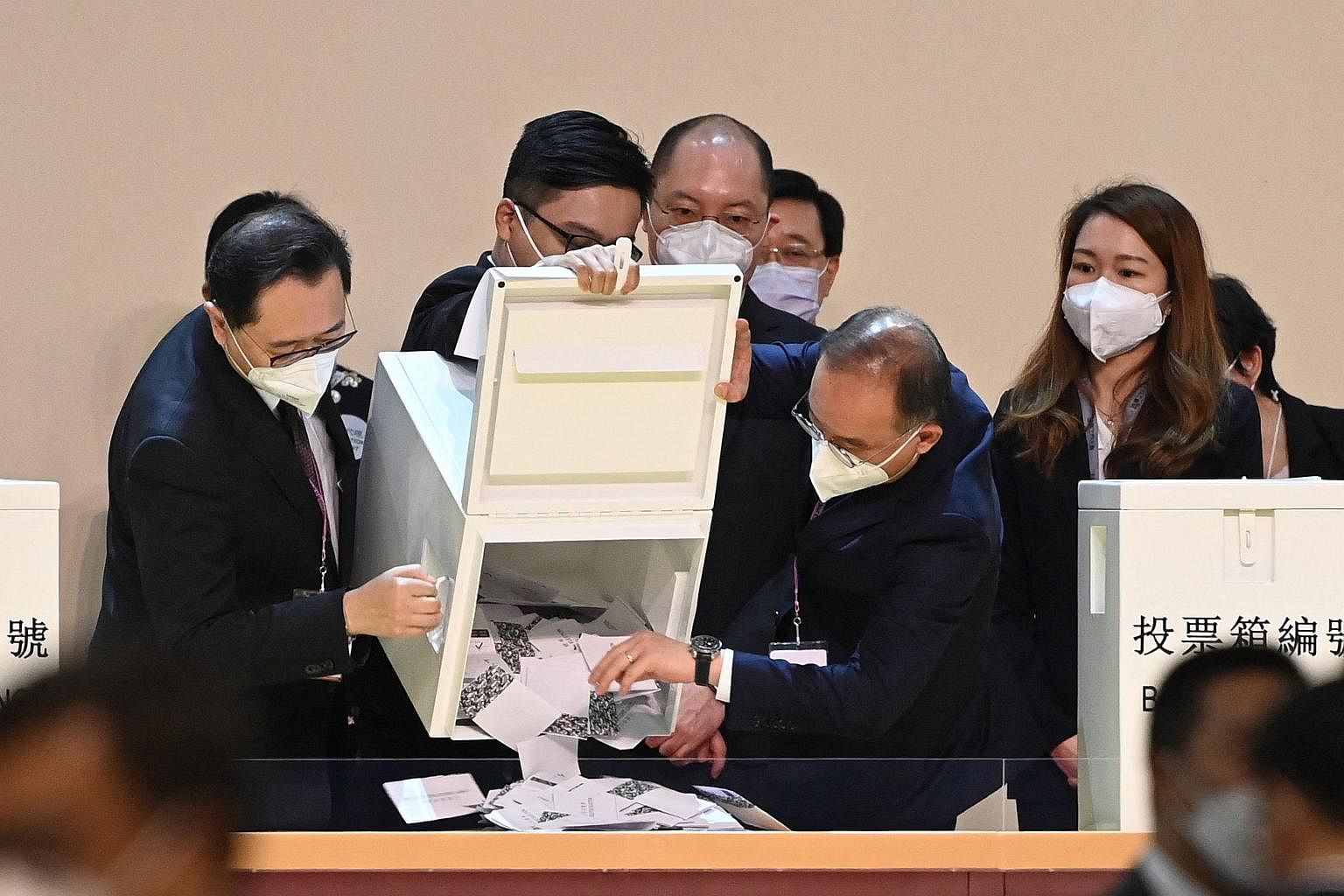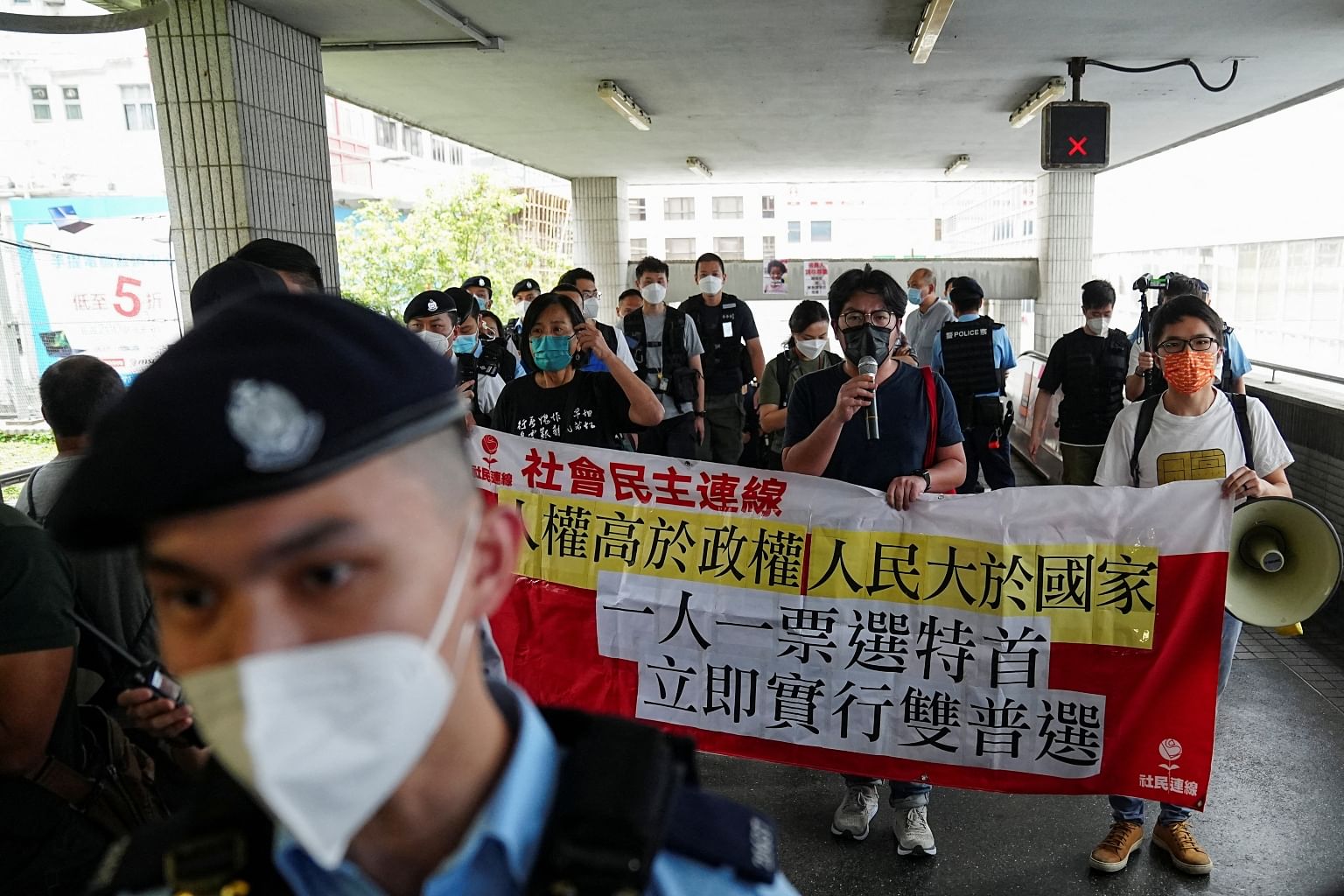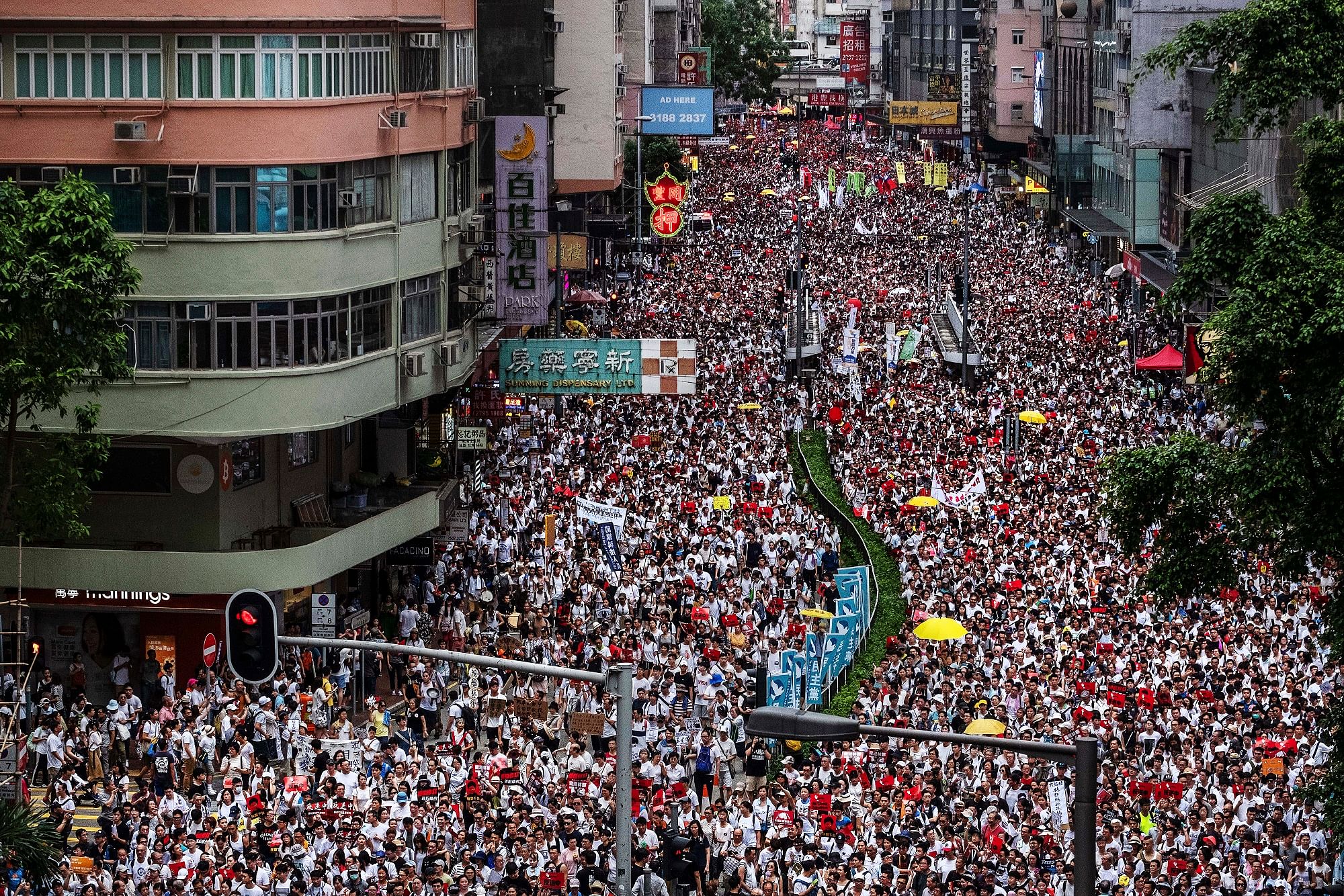John Lee wins Hong Kong's top job with 99% of votes
Sign up now: Get insights on Asia's fast-moving developments

Newly elected Hong Kong Chief Executive John Lee and his wife Janet celebrating on stage, on May 8, 2022.
PHOTO: REUTERS
Follow topic:
HONG KONG - Hong Kong’s chief executive hopeful John Lee won the top job on Sunday (May 8), securing over 99 per cent of votes cast in a small-circle election where he was the sole candidate in the running.
Analysts said the true test lies in the days ahead, when the leader-in-waiting will have to unite a fractured Hong Kong society and deliver results promised after a painful three years of turmoil due to anti-government protests and the coronavirus pandemic.
Mr Lee, 64, who is Hong Kong’s former No. 2 official, won 1,416 votes from the 1,461-strong overwhelmingly pro-Beijing election committee.
There were eight electors who voted against Mr Lee, and four invalid votes.
The 1,428 people - or 98 per cent of the committee members - cast their votes at the Hong Kong Convention and Exhibition Centre amid tight police presence.
Mr Lee, a career policeman and the city’s ex-security chief, required 750 votes to win.
“I have risen to this position today from the nobody I once was,” said Mr Lee at the end of a media session after the results.
“I will be responsible not only to the Chinese government, but also to the Hong Kong people.”
Acknowledging the myriad challenges in his path ahead, he added:“I am confident that the next administration will boldly and capably go about tackling the issues that Hong Kong faces.”
In a brief victory speech earlier, Mr Lee thanked all who voted, “whether or not you supported me”.
The landslide victory was an “expected outcome”, said Chinese University of Hong Kong senior lecturer Ivan Choy.
"Whether this makes governance for John Lee any easier is another thing... We shall have to wait and see if he can garner good cooperation from all of society's stakeholders."
Mr Choy said that in the final stage of incumbent Chief Executive Carrie Lam’s term, she was not aligned with the pro-establishment camp on one major issue. The latter supported tougher anti-Covid-19 policies, while Mrs Lam was more concerned with foreign stakeholders' interests.
"John Lee's immediate challenge will be whether or not he supports such strict universal testing and lockdown-type measures," he said.

Another immediate task for Mr Lee would be "to streamline cooperation and coordinate the different interests within the pro-establishment camp", according to veteran China watcher Johnny Lau.
"Other major difficulties ahead include building unity among the Hong Kong people," said Mr Lau, adding that this is a key priority that has long been emphasised by Beijing as well as the Hong Kong government.
"It won't be easy for him as Hong Kong people's morale now is rather low and the economy has been worsening even as the Covid-19 outbreak has abated."
Mrs Lam will hand over the leadership reins come July 1.
“I extend my sincere congratulations to Mr John Lee,” she said in a statement. “The present-term government and I will ensure a seamless transition with the chief executive-elect.”
The Hong Kong and Macau Affairs Office of China’s State Council issued a 5,000-word article hailing Mr Lee as a good leader for the city.
“John Lee was elected with 99.16 per cent of the votes. This shows completely that Hong Kong highly recognises him,” it said.
Mr Lee’s voting outcome is the strongest among all other chief executive candidates before him, although the odds were heavily stacked in his favour as all but one member of the recently revamped election committee are from the pro-establishment camp.
Hong Kong’s first chief executive Tung Chee Hwa received 80 per cent of support from a 400-strong selection committee in 1996, defeating two rival candidates. In 2007, his successor Donald Tsang beat a pro-democracy challenger with 82 per cent of votes cast from a 796-member committee.
Mr Leung Chun Ying won 57 per cent of nearly 1,200 votes in 2012, while Mrs Lam had 65 per cent in 2017. Both beat two other contenders.
There was no vote in 2002 and 2005 as Mr Tung and Mr Tsang were elected unopposed in those years.
The European Union on Sunday said that the anointment of Mr Lee as Hong Kong’s new leader violated democratic norms.
“The European Union regrets this violation of democratic principles and political pluralism and sees this selection process as yet another step in the dismantling of the ‘one country, two systems’ principle,” Mr Josep Borrell said in a statement.
In the days ahead, the central government in Beijing is expected to formally appoint Mr Lee as Hong Kong’s new chief executive. He could travel to the mainland later this month to meet China’s top leaders, local media reported.
Mr Lee will find himself - like all of the city’s previous leaders - sandwiched between Beijing’s demands and Hong Kong people’s interests.
Earlier on Sunday, veteran politician Regina Ip, chairman of the New People’s Party, said she believed Mr Lee’s focus on “results-oriented governance” would help Hong Kong navigate its difficulties.
"We believe John Lee has the leadership to solve all (of Hong Kong's) problems as far as he can," said Ms Maria Tam Wai-chu, another senior politician and the Basic Law Committee's vice-chairman.
Opposition party the League of Social Democrats staged a rare protest in Wan Chai, chanting “Power to the people, universal suffrage now”. The demonstration ended within the hour.

The election committee's sole non-establishment member, Mr Tik Chi-yuen, revealed on Saturday that he would vote for Mr Lee.
He told reporters that his centrist political party Third Side had concluded that the multitude of challenges Hong Kong faces today can be resolved only through communication and cooperation; opposing each other would result only in greater harm.
Mr Tik added that he hoped Mr Lee would be receptive to the people's opinions, accommodate different voices within society, and come up with concrete measures to carry out his four key policy directions.
Mr Lee had in his election manifesto last week outlined four broad areas he would focus on. They are to strengthen governance; provide more, better and faster housing; boost Hong Kong's competitiveness; and build an inclusive society with greater upward mobility for its youth.
He has also said he will set key performance indicators within the first 100 days of his administration to ensure accountability towards fulfilling his pledges.
It would be Mr Lee's third promotion in five years.
He was promoted to chief secretary only last June. Prior to that, he had headed the Security Bureau from 2017, after spending five years as undersecretary for security.
He was a career policeman, with 35 years in law enforcement under his belt.

A 2019 photo shows a protest against the extradition law in Hong Kong.
PHOTO: NYTIMES
As chief of the Security Bureau in 2019, Mr Lee played a key role in the push for an extradition Bill that would have allowed for criminal suspects to be transferred to mainland China, among other territories, to face trial.
That proposal sparked massive, often violent, protests across Hong Kong in 2019, and was eventually withdrawn.
Beijing imposed a wide-ranging national security law on Hong Kong the following year, and Mr Lee then led a crackdown on dissent under that law.
He is under sanctions by the United States for his role in compromising Hong Kong's autonomy and restricting its people's freedoms.
Mr Lee is married with two adult sons. He holds a master's degree in public policy and administration from Australia's Charles Sturt University.


